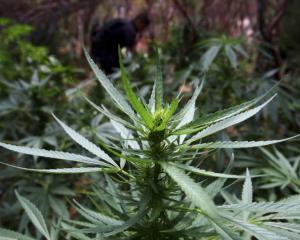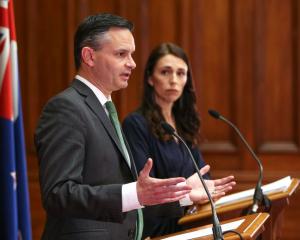
It also wants a levy on the use of nitrogen and phosphorus fertilisers, an overhaul of the labelling of sustainably grown and organic products and a resource rental fee on commercial use of water.
The Greens' "Farming for the Future" agriculture policy was launched by co-leaders Marama Davidson and James Shaw at a small organic farm in Canterbury.
Shaw said "the reality is that the way we currently farm" is accelerating climate change but New Zealand could transform the causes "into the solutions".
"Farming is at the frontline of the climate crisis, and any credible climate action must support people in the sector to transition to more sustainable practices.
"Successive governments have encouraged intensive farming, and prioritised profit over the environment and climate. This quantity-over-quality approach has degraded our rivers and waterways, harmed animals, and is warming the climate."
The primary sector held strong through Covid-19 and "that strength will be needed to help Aotearoa navigate the coming years" but smart choices needed to be made to tackle the climate crisis, the Greens' policy said.
$297m fund for farmers
The Greens would create a $297m Healthy Food and Farming Fund to help farmers move to low-emissions agriculture.

The fund would provide loans, grants, include specific funding for Māori agriculture organisations and would speed up the transition to regenerative farming, grow the organics sector and "set a fair price for agricultural greenhouse gas emissions".
"Like in any industry, there are farmers and growers already doing a fantastic job at mitigating their impact on the environment. There are others in the middle, making an effort," said Shaw.
"But then there are some who are not doing enough - and to fix this by reducing harmful practices."
Levy on artificial fertilisers
The Greens are also recommitting to a levy on nitrogen and phosphorous fertilisers, equating to about $1500 a year for an average dairy farm and $1200 a year for an average sheep.
The Greens previously wanted to put a levy on nitrate pollution. This was met with resistance by Federated Farmers, which said it was unfair as other sectors used nitrates, such as urban sewage treatment plants.
And as part of the Greens' three-point plan to tackle nitrogen pollution, it would also progressively tighten the limits on nitrogen application and set a "strong limit" for dissolved inorganic nitrogen in freshwater.
They also want to phase out Palm Kernel Expeller (PKE) as a supplementary feed by banning imports.
"Not only will these changes protect our land and waterways - but they will ensure New Zealand upholds the clean, green brand which keeps our products in-demand all over the world," said Shaw.
Overhaul the Organics Bill
The Greens also want to overhaul the Organics Bill currently before Parliament to create a robust certification scheme for organic growers and extend the country-of-origin food labelling to a wider range of food products.
The Greens would include a robust definition of "organic", clarify that existing organic certifications are valid and create an organic industry advisory group to oversee the legislation.
Shaw said the changes meant people doing their shopping knew they were buying the best, local, sustainable produce.
Their policy also commits to:
• $30m in funding over three years for community gardens and composting initiatives.
• Working with tangata whenua and within a te Tiriti o Waitangi framework to establish a resource rental on commercial use of water.
• Ensuring land use is diverse and sustainable, by changing the rules around forestry and strengthening land-use rules to protect high-quality soils and farmland.
"This is a bold, transformation plan to ensure a just transition away from intensive farming, which will help us meet our obligations under the Zero Carbon Act and ensure our grandchildren have a planet to live on," said Shaw.
"If we think ahead and act now, New Zealand can have a thriving, sustainable regenerative farming sector which ensures we all have what we need and are protecting our precious environment."













